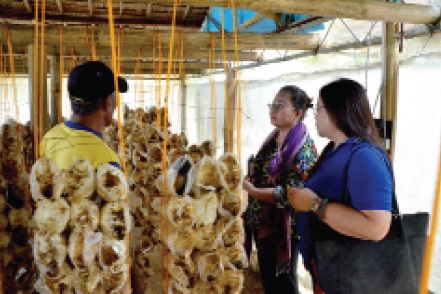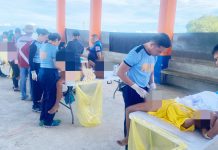
ORMOC CITY – Regional Director Sheila Enciso of the Department of Agrarian Reform (DAR) was amazed how the agrarian reform beneficiaries (ARBs) have improved their quality of lives.
Last week, Enciso, accompanied by Assistant Regional Director for Administration and Land Tenure Security Program, Ma. Fe Malinao, together with the Municipal Agrarian Reform Program Officers of Ormoc and Tacloban, and Chief Agrarian Reform Program Officer Tomas Martinez, visited seven ARB organizations who were installed into their awarded lots under the Comprehensive Agrarian Reform Program (CARP) from 2016 to 2018 in different areas here and in adjacent Kananga town with the help of KAISAHAN, a non-government organization.
She was surprised to see the big difference in the ARBs faces and stories they tell before and at present.
These ARBs received their certificates of land ownership award (CLOAs) many years ago, but struggled for 16 to 20 years before they were able to take possession of the awarded lots either due to strong resistance from the previous landowners or conflict between two contending groups of farmers.
Enciso was happy to see these farmers, who once stared fiercely due to frustrations, now smiling and full of inspiring stories to tell, because aside from the support services extended by DAR, they also get assistance from other government agencies.
In Barangay Sumangga, Pablo Silva, 56, president of the Sumangga United Farmers Association (SUFA), installed in 2016, showed to Enciso their livelihood project, a mushroom production they started in December last year through the assistance extended by the Department of Science and Technology (DOST).
Silva disclosed that mushroom production is one of their sources of livelihood now. Mushroom grows fast and are sold at P300 for every kilo, Silva shared.
He added that in a day they could harvest nine kilos.
In Barangay Dolores, Benedicto Taneo, president of the Dolores Farmers Association (DOLFA), brought Enciso to their demo farm and shared that they will soon be graduating from the Farmer Field School (FFS) facilitated by the City Agriculturist’s Office.
He disclosed that after FFS, they will be venturing in upland rice (locally known as calinayan) production and marketing.
In Barangay Salvacion, Bienvenido Matuguina shared that he invested part of his income, derived from the sugarland awarded to him, in calamansi production. At present, he has more than 100 calamansi-bearing trees planted in another lot.
He also disclosed that their organization, the Salvacion Farmers Association, has likewise 300 calamansi trees planted in preparation for the calamansi processing project they are planning to venture once the project proposal they submitted to DOST is approved.
In Barangay Sabang Bao, Enciso was caught by surprise when the ARBs, who were installed in April last year, were already harvesting rice in their awarded lots when she arrived; while in Barangay Montebello, the ARBs were peacefully preparing their once contested land to be planted with corn.
Meanwhile, Arnulfo Perez whom we had interviewed two years ago, proudly announced that he is now the president of their organization, the Valencia Small Farmers Association (VASFA).
In the afternoon of the same day, all concerned ARBs gathered in Barangay Montebello for a dialogue with Enciso.
During the said occasion, Enciso expressed her happiness upon seeing them living an improved quality of life as envisioned under CARP.
She likewise reminded the ARBs to continue keeping the land productive. Further, she encouraged those who have children entering college this coming school year to avail of the DAR Scholarship Program for the Dependents of Agrarian Reform Beneficiaries (DSP-DARBs), a new assistance program extended by the agency to its ARBs. (JOSE ALSMITH L. SORIA)



